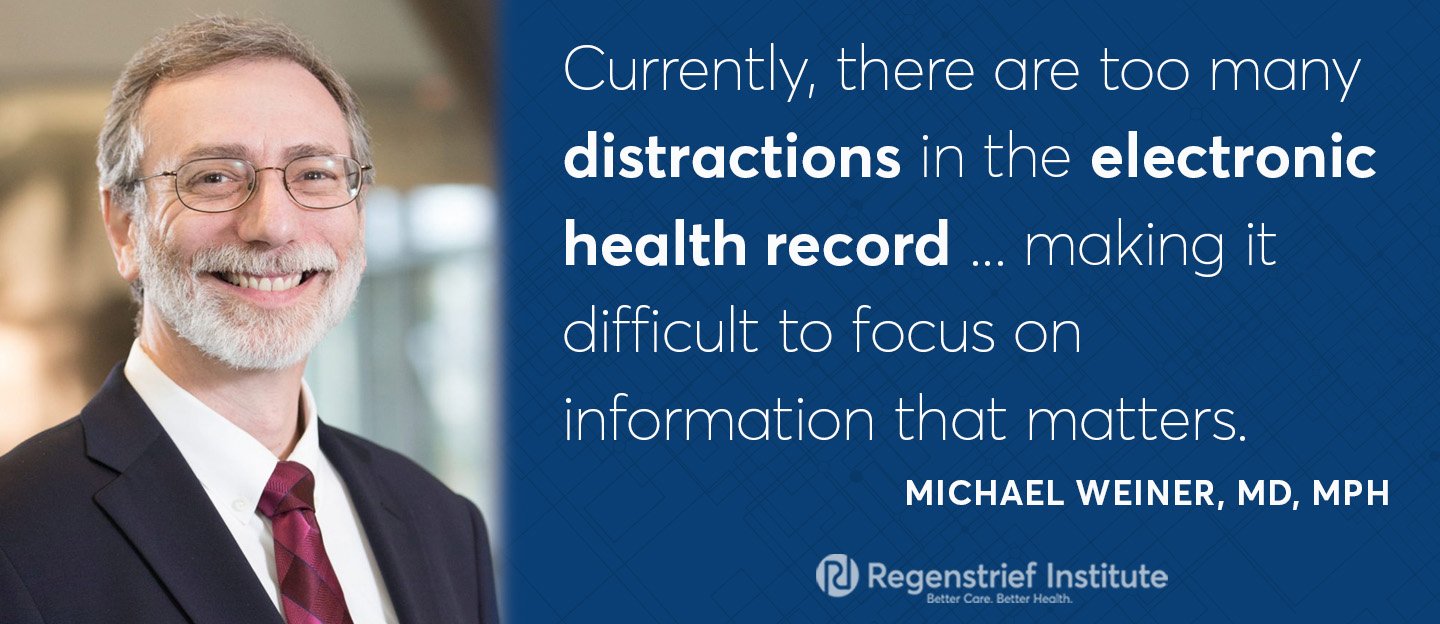In an editorial in the Journal of General Internal Medicine, Regenstrief Institute research scientist Michael Weiner, M.D., MPH highlights shortcomings of electronic health records (EHRs) in living up to their full potential and suggests ways to use EHRs to work more efficiently and ultimately more effectively for patients.
“When I am reading a patient’s EHR, a lot of what I want to know and am seeking is what other healthcare professionals learned when they assessed the patient, and what they thought were the most important findings in terms of diagnosis and treatment,” said Dr. Weiner, who is an internist. “What I encounter much too often is that key pieces of the patient’s record are in the wrong place or embedded so deeply in the EHR that they are hard to locate or may not even have been documented.”
“Currently, there are too many distractions in the EHR, such as descriptions of old, resolved problems that are repeatedly cut and pasted again throughout the record, making it difficult to focus on information that matters. The technical challenges are complex, but we need to redesign EHR platforms so that relevant data are clearly and readily accessible.”
In his thought-provoking editorial titled “Forced Inefficiencies of the Electronic Health Record,” Dr. Weiner draws upon his experience as a primary care physician to propose 13 specific principles that he believes will improve EHRs to the benefit of both clinicians and the patients for whom they care. He challenges EHR vendors, health systems, doctors, nurses and other front-line professionals to adopt these measures to fight inefficiencies and improve the function of the EHR. Until they do, he believes, EHR systems will continue to be slow, cumbersome, and difficult to use, with vital medical information overshadowed by voluminous unimportant content, distracting healthcare providers and potentially resulting in medical errors. Improvements in EHR design and user interfaces can correct many of their deficiencies.
With many clinicians spending about half of the workday on EHR and desk work, Dr. Weiner’s goal is to stop unnecessary repetition and misplacement of information within patient records, squelch user burnout related to information overload and the burdens imposed by many EHR systems, and ultimately to combat the adverse consequences of today’s EHR’s on patient care.
Many of his recommendations target EHR vendors and their product designs, while others are directed at users and others who work in healthcare settings.
Dr. Weiner, who is both a practicing physician and a health services and outcomes researcher studying doctor-patient and clinician-clinician communication, also observes that when patients have the ability to examine and contribute to their own EHR, there can be a positive effect both on accuracy and patient satisfaction.
He concludes the editorial by speaking out for physicians dedicated to patient care. He writes, “Most of all, when it comes to the record [EHR] and me [the physician interacting with the patient], I still want my voice, that part of the record that tells other people what I think the problem is, and what should be done about it.”
Dr. Weiner is associate director of the William M. Tierney Center for Health Services Research at the Regenstrief Institute, chief of Health Services Research and Development and a principal investigator in the Center for Health Information and Communication, Richard L. Roudebush Veterans Affairs Medical Center, associate director of the Indiana University Center for Health Services and Outcomes Research, and a professor of medicine at Indiana University School of Medicine.









